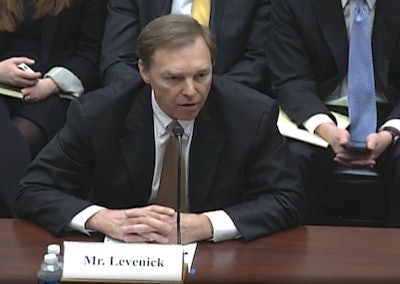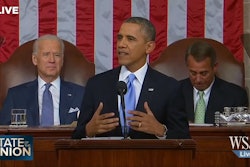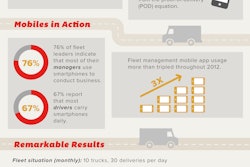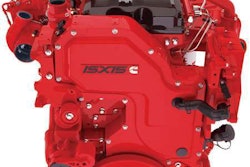American jobs, the economy, and global competitiveness are at stake without a modern transportation network, a panel representing U.S. governors, mayors and manufacturers told Congress Tuesday, testifying in the year’s first hearing on a new highway bill.
 “If you have a world-class port and the highway infrastructure surrounding it isn’t up to standard, you haven’t gained anything,” Caterpillar Inc. Group President Stuart Levenick tells Congress.
“If you have a world-class port and the highway infrastructure surrounding it isn’t up to standard, you haven’t gained anything,” Caterpillar Inc. Group President Stuart Levenick tells Congress.Citing the trickle-down uncertainty caused by a series of temporary funding extensions that preceded the current two-year surface transportation bill, the panel urged Congress to come up with a stable, long-term plan to maintain and improve the nation’s transportation system.
In a divided Congress, that’s more easily asked than done, but House Transportation and Infrastructure Committee Chairman Bill Shuster is an optimist: He’s shooting to have a six-year bill out of committee in time for a floor vote ahead of the August recess. MAP-21, the 18-month highway bill passed in 2012, expires at the end of September.
“This bill needs to be fiscally responsible and to build on the reforms in MAP-21. We need to continue to reduce regulatory burdens. And we need to make sure our federal partners have flexibility in how they spend their money and approve projects,” Shuster said in his opening remarks. “We can’t afford to be stuck in the past or we’ll be left behind.”
With the Highway Trust Fund – the dedicated source of highway and transit funding – projected to go broke within two years, much of the committee’s focus will have to be on fuel tax increases or finding alternatives.
RELATED: Highway bill debate ramps up
But the budget squabbles and non-stop political posturing that have limited legislative productivity in recent years have likewise impeded efforts to develop solutions to the transportation funding crisis.
In the meantime, states and cities have had to make do, as Oklahoma Governor Mary Fallin and Atlanta Mayor Kasim Reed testified before the committee. (Follow the links for the written testimony.)
“But successful state action does not justify federal disengagement,” said Fallin, chair of the National Governors Association and a former member of the transportation committee. “Surface transportation requires both a long-term vision and funding stability.”
Both Fallin, a Republican, and Reed, a Democrat, challenged the committee – whose members routinely boast of its bipartisan effectiveness – to “put all options on the table” in the funding debate.
Reed, speaking on behalf of the U.S. Conference of Mayors, also emphasized that cities had benefited greatly from local projects and the direct jobs created through the Recovery Act’s TIGER grant program and MAP-21’s TIFIA loan guarantees. He encouraged Congress to retain similar provisions in the next funding bill.
As an example of successful cooperation, Reed noted that Atlanta’s population was probably 20 years ahead of the growth that had been planned for and “needed the government’s help” to move forward with essential projects. The assistance the federal government provided would be paid back “in full” through TIFIA.
“This is real money, real job creation,” he said, noting the importance of transportation within and through Atlanta as a major regional, national and international trade hub.
RELATED: Trucks need to pay more to fund highways, Congress told
Indeed, U.S. competitiveness in the global marketplace is stifled by an outdated, inefficient, and congested transportation system, testified Caterpillar Inc. Group President Stuart Levenick.
Levenick got the attention of the committee when he explained that Caterpillar now moves 40 percent of its exports through Canadian ports because goods are processed and shipped two and three days faster than via U.S. ports.
Agreeing with the governor and mayor, he also emphasized the importance of thinking of transportation infrastructure as a network, rather than as competing projects.
“Our modes aren’t as aligned as they are in other countries. If you have a world-class port and the highway infrastructure surrounding it isn’t up to standard, you haven’t gained anything,” he said. “If we wind up with a patchwork of 50 different solutions, you don’t have network – and that’s some of the heartburn we feel today. Some states didn’t keep up.”
In the coming month the committee will hold more hearings and roundtable discussions “to give stakeholders an opportunity to share their policy priorities and concerns,” Shuster noted.
“It’s going to be important that stakeholders and members of this committee educate and inform the American people. They don’t have the same world view, or understand what’s happening to a big city if it’s not being connected,” he concluded. “And some members of Congress aren’t clear on how far we’re falling behind in our transportation infrastructure.”









